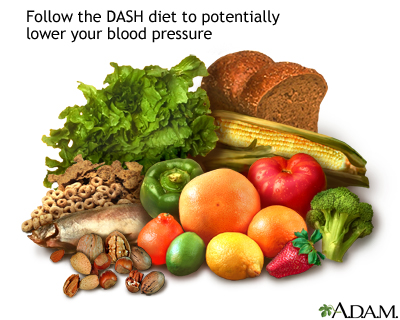| Step 9: Maintain healthy habits |
You can make lifestyle changes that may lower or prevent high blood pressure. These healthy habits are important for anyone who has been diagnosed with high blood pressure or anyone in the "pre-high blood pressure" category. Regardless of your current blood pressure or whether you are taking blood pressure medications, these steps will improve the quality of your life.
Of course, EVERYONE ELSE benefits from these healthy habits, too -- by preventing high blood pressure in the future!
Keep your weight at a healthy level
If you are overweight, focus on losing those extra pounds. Losing just 10 pounds may be enough to lower your blood pressure. Losing weight can help to enhance the effects of blood pressure medication and may also reduce other risk factors, such as diabetes and high cholesterol.
Weight loss generally involves changing your diet and increasing physical activity. This may not be easy, but with persistence and changing your overall eating habits, it can be done successfully. Talk with your health care provider about a diet plan that is appropriate for you. Be wary of diet pills and crash diet programs, as these plans may involve taking supplements that may actually increases blood pressure in the short term.

Choose healthy foods
The old saying "You are what you eat" is true when it comes to maintaining a healthy weight and blood pressure. According to the National Heart, Lung, and Blood Institute, studies show that what you eat directly affects the development of high blood pressure.
One of the most effective diets is called Dietary Approaches to Stop Hypertension (DASH).
This diet recommends that you eat:
- Foods low in saturated fat, cholesterol, and total fat
- More fruits, vegetables, and low-fat dairy products
- More whole grain foods, fish, chicken, and nuts
- 3,500 mg of dietary potassium each day. Foods rich in potassium include green leafy vegetables, orange juice, potatoes, brown rice, avocados, and bananas
- LESS red meat, sweets, and drinks high in sugar
- No more than 3,000 mg of sodium per day. In fact, other experts from the National Institutes of Health actually recommend that sodium intake be no more than 2,400 mg per day. Some people may benefit from an additional reduction of sodium to 1500 mg. daily.
The DASH diet shows a dramatic reduction in most people's blood pressure. The reductions in blood pressure may even begin within 2 weeks of starting the diet plan. For more detailed information on the DASH diet: click here. (Note: file requires Adobe Acrobat.)

Limit alcohol
Finally, limit the amount of alcohol you drink to no more than one ounce per day if you are a man, and no more than 1/2 ounce if you are a woman. (1 ounce of alcohol is in 24 oz of beer, 10 oz of wine, or 2 oz of 100-proof whiskey.)
Reviewed By: Steven Kang, MD, Division of Cardiac Pacing and Electrophysiology, East Bay Arrhythmia, Cardiovascular Consultants Medical Group, Oakland, CA. Review provided by VeriMed Healthcare Network. Also reviewed by David Zieve, MD, MHA, Medical Director, A.D.A.M., Inc.
